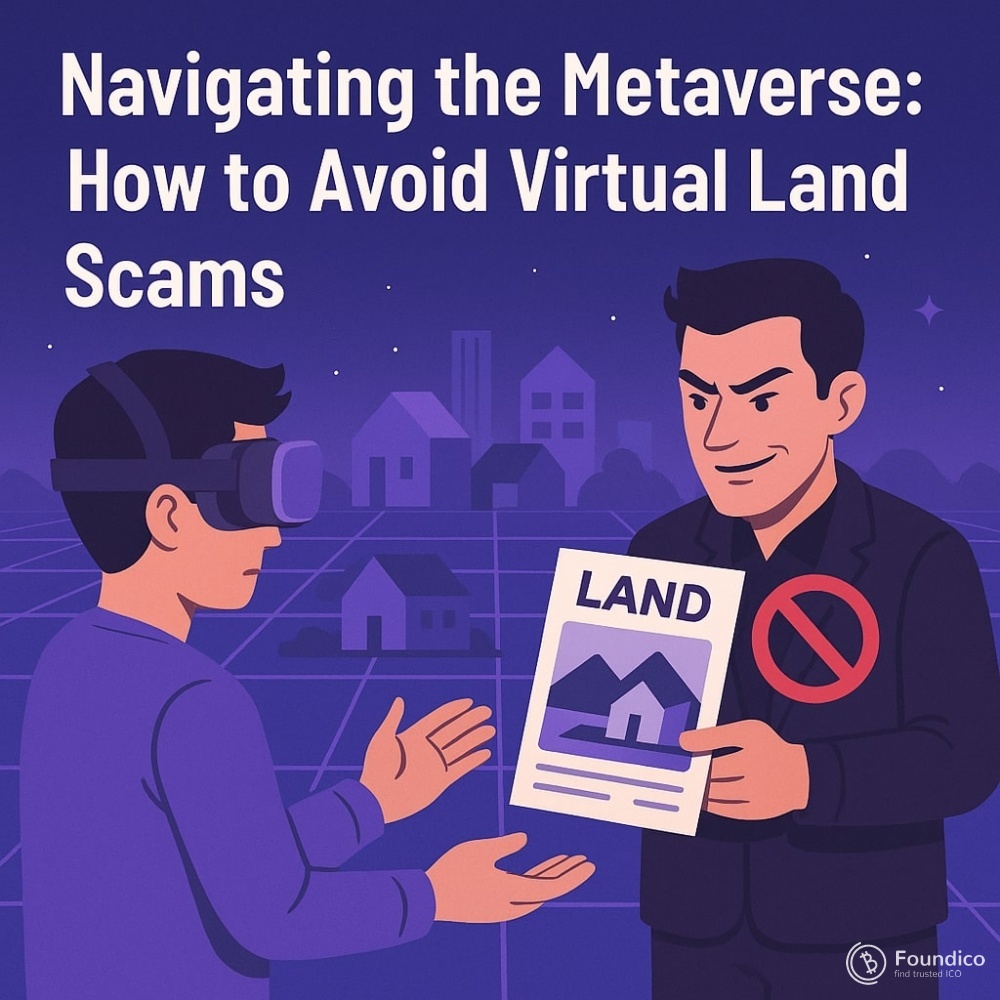Navigating the Metaverse: How to Avoid Virtual Land Scams

By Dr. Pooyan Ghamari, Swiss Economist and Visionary
The concept of the metaverse—an immersive, interconnected virtual universe—has captured imaginations worldwide and sparked a digital real estate boom unlike any seen before. From virtual malls and galleries to digital parks and private estates, the idea of owning “land” in the metaverse is rapidly becoming a reality for millions. However, this exciting frontier also presents unique risks, chief among them the growing prevalence of virtual land scams.
As virtual properties increase in value and popularity, scammers are exploiting the hype, preying on unsuspecting buyers through deception, fraud, and manipulation. Navigating this new digital landscape safely requires vigilance, education, and a solid understanding of how these scams operate. In this article, we explore the nature of virtual land scams and offer practical advice on how to protect yourself in the metaverse.
The Rise of Virtual Real Estate
The metaverse blends augmented reality (AR), virtual reality (VR), blockchain, and social networking to create spaces where users can work, socialize, and transact. Virtual land—parcels within these digital worlds—is bought, sold, and developed much like physical real estate. Platforms such as Decentraland, The Sandbox, and others have launched marketplaces where parcels are traded as non-fungible tokens (NFTs), providing proof of ownership secured by blockchain technology.
The allure of early investment, the potential for profitable development, and the cultural appeal of digital ownership have driven virtual land prices upward. But as with any speculative market, this rapid growth invites bad actors.
Common Types of Virtual Land Scams
1. Fake or Non-Existent Plots
Scammers create websites, social media pages, or marketplaces offering parcels of virtual land that either don’t exist or aren’t legitimately for sale. Victims pay for these “properties” only to discover they have no ownership or claim in the platform’s ecosystem.
2. Phishing and Impersonation
Attackers pose as reputable metaverse developers or platforms, sending phishing links to trick users into revealing their digital wallet credentials or private keys. Once compromised, the scammers can steal NFTs, cryptocurrency, and other assets.
3. Pump-and-Dump Schemes
Fraudsters artificially inflate the price of virtual land parcels through hype, misleading information, or coordinated buying. After driving prices up, they sell their holdings at a profit, leaving late buyers with worthless or devalued assets.
4. Fake Investment Funds and Brokers
Some scams involve fake brokers or investment funds promising guaranteed returns on virtual land, soliciting deposits from investors, and then disappearing with the funds.
5. Counterfeit NFTs and Title Forgery
Scammers may create counterfeit NFTs representing ownership of virtual land parcels, or forge digital titles and contracts that look authentic but lack blockchain verification.
Why Are Virtual Land Scams So Effective?
-
Lack of Regulation: The metaverse operates largely in a decentralized, unregulated environment, making legal recourse difficult.
-
Complex Technology: The combination of blockchain, NFTs, and virtual platforms can be confusing, especially for newcomers.
-
Hype and FOMO: Fear of missing out drives buyers to act quickly without thorough due diligence.
-
Irreversible Transactions: Blockchain transactions are final, so once funds or NFTs are transferred, they cannot be reversed.
How to Protect Yourself from Virtual Land Scams
1. Verify Platform Legitimacy
Always confirm that the metaverse platform you are engaging with is reputable. Check for official websites, verified social media accounts, and credible community feedback. Platforms like Decentraland and The Sandbox have official marketplaces and partnerships listed on their sites.
2. Use Secure Wallets and Authentication
Store your cryptocurrency and NFTs in secure wallets with strong passwords and enable multi-factor authentication. Be wary of unsolicited messages asking for your private keys or login credentials.
3. Conduct Thorough Research
Before purchasing any virtual land, research the parcel’s history, ownership, and the platform’s rules. Use blockchain explorers to verify NFT authenticity and transaction history.
4. Avoid Unrealistic Offers
If a deal sounds too good to be true, it probably is. Be cautious of parcels offered at steep discounts or “guaranteed” investment returns.
5. Engage with the Community
Participate in forums, social media groups, and official platform channels. Experienced users often share warnings about emerging scams and provide valuable insights.
6. Consult Professionals
If you are making significant investments, consider consulting experts in blockchain, digital assets, or legal advisors specializing in virtual property.
The Role of Regulation and Industry Standards
As the metaverse economy grows, regulators around the world are starting to examine the space more closely. While decentralized platforms resist traditional regulation, there is increasing pressure for standards on transparency, consumer protection, and dispute resolution.
Industry groups and blockchain projects are also developing self-regulatory frameworks and certifications to enhance trustworthiness and security for virtual land transactions.
Looking Ahead: The Future of Virtual Land Ownership
Virtual real estate will continue to expand as the metaverse evolves, bringing new opportunities and challenges. Education, technological safeguards, and collective vigilance will be essential to ensuring this digital frontier is safe and fair for all participants.
Final Thoughts by Dr. Pooyan Ghamari
As a Swiss economist who closely monitors the intersection of emerging technologies and markets, I see the metaverse as a transformative development with enormous potential. However, the risks of virtual land scams remind us that innovation without caution can lead to significant losses.
For anyone venturing into the metaverse, knowledge and prudence are your best allies. Protect your digital assets as diligently as you would physical ones, and always question the legitimacy of offers that come your way.
By approaching virtual real estate with a careful, informed mindset, you can enjoy the benefits of this new digital era while minimizing the risks posed by fraudsters.

 Best Wallet - Best Wallet Token, revolutionizing the Web3 experience. $BEST token reduces transaction fees, grants exlusive early access to the hottest presales and gamifies wallet engagement.
Best Wallet - Best Wallet Token, revolutionizing the Web3 experience. $BEST token reduces transaction fees, grants exlusive early access to the hottest presales and gamifies wallet engagement.